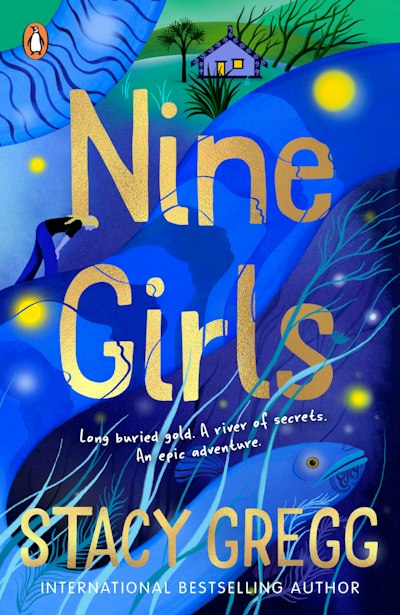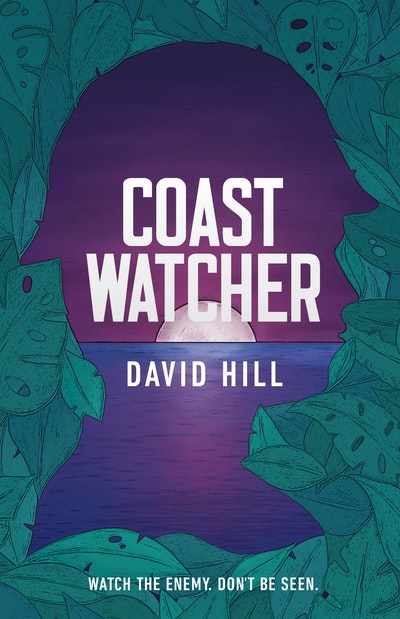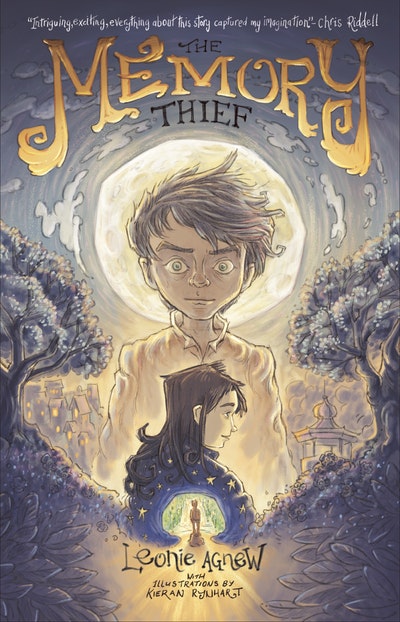- Published: 26 March 2024
- ISBN: 9781776958146
- Imprint: Penguin
- Format: Paperback
- Pages: 288
- RRP: $22.00
Nine Girls
Extract
CHAPTER ONE
Tapu
I WAS SIX WHEN MY goat left home to go work for Santa.
Looking back, nothing sticks out as extraordinary about that day. It was my second year at Vicky Ave Primary, but only my first year in Miss Batty’s class. I clearly remember, when I left for school that morning, seeing Twinkle tethered to the lawn, nibbling happily on Mum’s gardenias. When I got home again that afternoon he was gone, and Mum was in the kitchen making afternoon tea as if nothing was wrong!
“Where’s Twinkle?” I asked her.
“Santa Claus took him,” Mum said.
“But why?”
“Because one of the reindeer is sick.” Mum kept cutting sandwiches. “Santa’s got a busy schedule with Christmas coming up. Twinkle is filling in.”
I did cry a bit at first, and even refused the peanut butter and banana sandwich on account of my grief. But Mum was positive about Twinkle’s decision to go. “Think of all the kids who need toys,” she said. “Twinkle is helping all the children in the whole world.”
She was right, of course. What was my problem? I should be proud that my Twinkle was working for Santa. The Santa! Literally the most famous guy in kid-dom! Of all the goats in the world, Santa had chosen mine to pull his sleigh.
“Is he going to be at the front?” I asked.
“I should think so,” Mum agreed without hesitation.
“What about Rudolph?” He had the red nose to light the way. Surely he wasn’t getting rolled from the top job by a goat?
“He’s right behind Rudolph,” Mum reassured me. So, that was definitive. My goat was the deputy. Good call, Santa. Twinkle had always been a good wingman. You wouldn’t want him running the show— he didn’t have the acumen — but give him just enough responsibility and he’d be a star performer in the reindeer squad.
“Will he look after him and feed him?” I worried.
“Of course he will,” Mum said. “He’s Santa.”
~~~
WHEN THE CHRISTMAS TREE WENT up in the lounge the next week, I thought of what lay ahead for Twinkle. The pressure! All those presents to deliver around the world! The other reindeer, apparently, was still on bed rest. Christmas was only a few days away, and the clock was ticking on Twinkle’s debut.
On Christmas Eve, I went to bed when it was still light. The sooner you go to sleep, the sooner Santa will come. I lay there and squeezed my eyes tight shut and I tried to sleep and the next thing I knew, Mum was at my bedside.
“Titch!” she hissed. “Santa is here! He’s on the roof right now in his sleigh with your presents, and he’s got Twinkle with him. Listen! Do you hear them?”
I listened hard. But nothing.
“I don’t . . .”
And then . . . tchock-tchock! The unmistakeable clack of hooves on the roof above my head!
“I can hear Twinkle! They’re up there right now!”
“That’s right,” Mum confirmed, “Twinkle’s on the roof.”
“Twinkle!” I stood up on the bed, eyes on the ceiling. “Twinkle is on the roof with Santa! I can hear them! I can hear Twinkle!” I leapt down, making for the door. “Let’s go outside and see him!”
“No.” Mum was firm. “Santa will just fly off. He won’t come in if you aren’t asleep. If you want your presents, you have to get back into bed now and shut your eyes and count reindeer and go back to sleep.”
“Do you think once Santa has delivered all the presents around the world he will bring Twinkle home?” I asked as she tucked me back in.
“I think he still needs him,” Mum said. “The other reindeer is still sick.”
She really had the inside track on how Santa was running his operation.
“Goodnight, Twinkle,” I whispered as the hoofbeats tapped on the roof one last time. “I hope you come home soon.”
~~~
BUT TWINKLE DIDN’T COME HOME. We got a mower instead. I moved up to my second year in Miss Batty’s class. I hated Miss Batty by then, and I think the feeling was pretty mutual. No matter how high I held my hand up or how straight I sat on the mat, I was never picked.
I was pretty glad the school year was coming to an end. And it was almost Christmas again, which meant Twinkle would be visiting us once more. Santa had never returned him to me after last time because, obviously, he had proven himself an invaluable member of the reindeer team. I was pretty proud, but I played it humble, like Twinkle would have wanted. I didn’t brag even though it was hard to resist sometimes, considering what a star Twinkle was. Especially when I was dealing with a total spoon like Trent Dunn.
We were on the jungle gym. I was wearing my favourite sweatshirt, which had a picture of a turtle on a skateboard and words that read: Cream cheese and jelly is good for your belly. I had two blonde plaits that my mum had done that morning, which were already falling apart before I even walked out the door, and I was wearing a kilt skirt that I hated because you couldn’t hang upside down without showing everyone your knickers. Trent was there, blowing snot bubbles out of his nose like he always did, and so I couldn’t hang upside down without him seeing.
“I’m getting a Tonka bulldozer for Christmas,” he said.
“I’m getting a Barbie campervan,” I said, and then, to prove my VIP status I added, “My goat works for Santa.”
“Hah,” Trent sneered. “You’re such a dumb baby. There is no Santa Claus.”
When Mum picked me up after school I was a mess, covered with blood and snot. The blood was Trent’s but the snot was mine, from crying so hard. The note that Miss Batty sent home with me was headed up: “Playground brawl over existence of Santa Claus”.
~~~
I DON’T BELIEVE IN SANTA anymore. Or god. I’m twelve now. I’ve been in a plane to Christchurch twice since then, and once you’ve done that and gone over the clouds and seen there’s nothing up there . . . well, that’s the end of god. Plus, if he’s real, then explain why children are starving in Africa.
Tapu is different. It’s not like god or Santa. Tapu is real, and dangerous, and alive. It’s in the whenua all around us. It’s in our blood. We were Māori once. I know I don’t look it, but my nan does. She lives in Ngāruawāhia, where the Māori Queen lives. Nan has nine brothers and some of them are pango like her and some of them are Pākehā-looking with blonde hair and green eyes, like my Uncle Ernie, who looks like James Dean.
Nan says she got hit on the hands with a ruler when she spoke Māori at school and that was when she stopped being Māori. She got a prize at school for her handwriting, but she left when she was thirteen. She lives in Galileo Street, “on the good side of the river. Not the pā side.”
Nan’s not a Māori anymore but she still believes in tapu. The way she gives a weird shiver when we reach that particular bend in the river on State Highway One when we drive from Remuera to Ngāruawāhia? That’s tapu. Doing the wiriwiri with her fingers as she reaches anxiously to turn down the radio as we drive past Taupiri Mountain where the urupā is high up on the hillside? Tapu is making her hands twitch.
“Why are you turning the music down?” we complain.
“Stop being hōhā!” Nan will growl. “Your tūpuna don’t need to be disturbed by your ABBA. Wake them, and you’ll be sorry.”
When Nan was still a Māori her family lived right here, in the shadow of her tūpuna’s graves, on their farm on the banks of the Mangawara. It wasn’t a good farm, there were no crops and the house was only three bedrooms, but she lived there with her nine brothers and her mum and her granny.
All Nan’s stories from that time are mostly about how poor they were and the naughty stuff her brothers did to make money. Everyone calls her brothers The Beagle Boys, like in the comic books. The Beagle Boys are robbers, with masks like raccoons and bags of loot. Criminals — but the good, fun kind, like Robin Hood.
The best story Nan tells about Uncle Ernie is about the pig and the gold.
“This was during the Depression, when everyone was poor. We had come into a little money from selling our paper flowers at the regatta, which was like a big town fair, when all the waka were on the river and there were sideshows and candy floss and toffee apples. Anyway, afterwards Granny said we should use the money to buy a piglet to fatten up,” Nan tells it. “And so Granny gave Ernie the money to go and buy it, and he went to Ngāruawāhia to fetch it. He left in the morning and by dinner that night he still wasn’t home.
“It was after midnight when Uncle Ernie came home at last. He’d been drinking, and he had no money and no pig! Granny was very angry, but Ernie said, ‘Wait! I’ve got something better than a pig. Something that’s going to make us all rich!’”
I love the way my nan tells this story.
“So Ernie tells us about how he only stopped in for one beer at the RSA, on account of it being such a hot day and he was very thirsty, but then he got to talking to an old Māori man,” Nan says. “This old man, he was a war veteran, full of stories. He asked Ernie where he was from, and he said Taupiri, and it turned out this man used to know our koro, and he knew the farm. In fact, he seemed to know everything about our family. And this old Māori man dug around in his coat for money for more beer but he didn’t have any, so then he said to Ernie, ‘Tell you what, you buy me a round or two and I’ll tell you a secret about that farm of yours —a very valuable secret.’”
And so of course Uncle Ernie bought the old man his beers, and then the old man told the story to him. By the time he arrived home that night, having spent all the family’s money, no one could be angry with him because he really did have something better than a pig — he had the details of a hidden treasure, a box filled with gold, buried right there on the farm!
“The old man told Ernie that the gold had been buried on the farm before we lived there — back in the time of the Māori Wars, in 1863, when the Governor marched his troops from Auckland to seize the Waikato,” Nan says.
“There was fighting all over the place back then,” she tells us. “They were very dangerous times. And one day, there came these two Māori warriors riding on horses through Taupiri. And in their bag was a box full of gold coins. These men had stolen the payroll intended for the Imperial soldiers. But just as they reached the farm, right at the foot of Taupiri Mountain, they saw there was a troop up ahead of them. They had enemies in all directions. There was no escape.”
“So they buried the gold?”
“It was the only way to protect it. They buried the gold beside the Mangawara. And to keep it safe until they could return again, one of them placed a tapu on it so that anyone except them who touched it would die.”
But they never came back. And I don’t know how the man in the RSA knew the story but he did, and he told Uncle Ernie.
“There was gold,” Nan says, “under our very feet! But we couldn’t touch it.”
“Because of the tapu.”
Nan nods. “And that would have been the end of the matter, except we were very poor. Ten kids is a lot to feed with no money. And so, Granny, who was Ngāti Maru, she thought hard on the problem, and she called us mokopuna to her and she said: ‘I propose to seek out this buried treasure. I will lift the tapu from the gold and you will all be rich.’
“Of course, we said no because it was too dangerous,” Nan continues, “but Granny insisted. She said ‘I am a very old woman, and I do not fear death. Let me do this for our family.’”
And no one ever argued with Granny, because she had a moko on her chin and great mana. So the hunt for the gold was on!
When the day of the gold hunt came, Uncle Ernie, who had started it all, suddenly disappeared — he said he had some business in town. But Uncle Colly, Jock, Pat and Red were there, and Timoti, and Hēmi, maybe not Eru or Shorty, as they were the youngest and not ready yet for these kinds of adventures.
In preparation for the task, the night before, my uncles sharpened slender rods of metal, honing them to a point at one end. Their plan was to use these rods to spear through the ground, hoping to connect with the metal safety box hidden beneath the soil.
And so they set off in their waka, travelling down the Mangawara until they pulled ashore on the river banks at the site of the buried gold. They hunted about for the place where Uncle Ernie claimed the gold should be and began to poke about with their sticks.
“And as they laboured,” Nan says, “Granny sat in her canoe on the water and smoked her pipe and did the waerea, the protective spell to lift the tapu.”
My uncles poked and prodded with their rods, pushing their metal sticks deep into the ground like long, black fingers.
“You’re not pushing deep enough, maybe?” my nan offered from the sidelines.
“E kī? Have a go yourself then, if you’re so clever!” her brothers replied.
And all this time my great-great-granny sat in the boat and murmured the waerea, cleansing the path ahead, trying to connect to the wairua tapu, preparing for when the moment came . . .
And then, at midday, when the sun had risen to its hottest point and my uncles were fed up with poking, something unexpected happened.
Deep in the river waters, below Great-Great-Granny’s boat, the dark depths of the Mangawara began to stir. Whirlpools and eddies began to swirl. Then, out of the murky water, a shape leapt up and landed square in the black skirts of my great-great-granny’s lap.
“It was a kākahi,” Nan says, “a freshwater pipi. And my granny looked at the kākahi squirming in her lap and she said, ‘Stop your digging. This kākahi is the sign I have been seeking. The river has changed its course and now the gold is right beneath me here in the water.’”
And of course you can’t dig underwater, so the gold could not be found. My uncles were very grumpy, as they’d already spent the gold in their heads, but no one would ever have dreamed of arguing with Great-Great-Granny who, after all, had the wairua tapu on her side.
She lived for a long time after that. And the gold remained buried, with its tapu intact. A tainted fortune lying in wait for its victims, just like King Tut and the mummy’s curse, which I did a project on for school. My nan says the gold is still there to this day. And even though we are not real Māori anymore, I know that tapu is still real. And I suppose that is where my story begins.
Nine Girls Stacy Gregg
Nine Girls is a page-turning adventure from Stacy Gregg, one of Aotearoa’s most internationally successful and locally awarded writers.
Buy now











